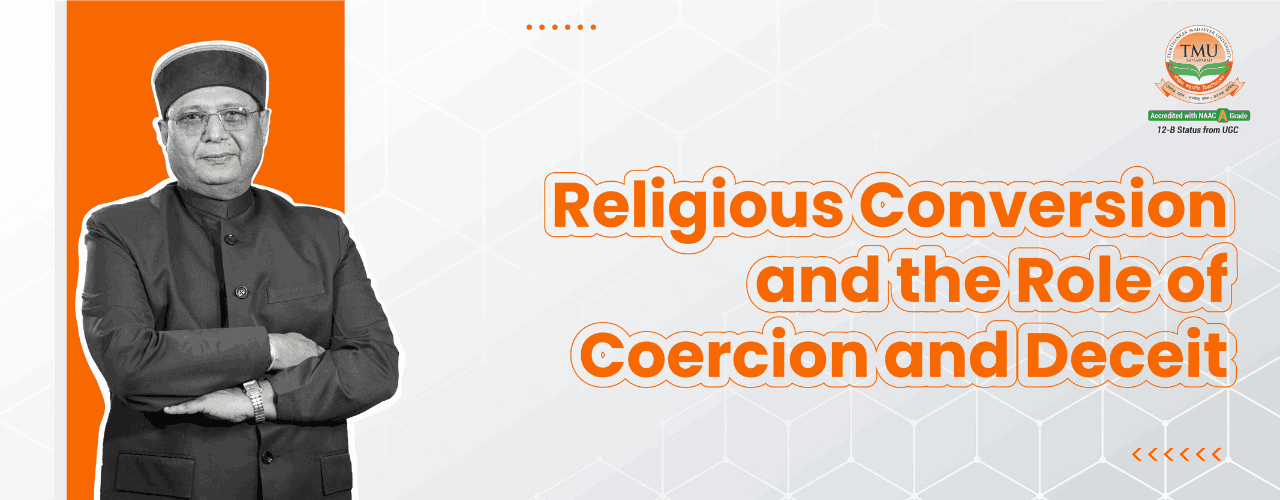The Legal Lens on Religious Conversion: Consent, Coercion, and Constitutional Balance
Table of Contents
By Prof. (Dr.) Harbansh Dixit
The Supreme Court of India has recently taken a stern and sensitive stance regarding cases of religious conversion involving force, fraud, or inducement. During the hearing of a public interest litigation (PIL), the apex court recognised such conversions as a potential threat to national security and questioned the Central Government on measures taken to curb coercive and deceptive conversions carried out through allurements or pressure.
This issue has appeared before the court in the past as well, most notably during the 1960s when states like Madhya Pradesh, Odisha (formerly Orissa), and Bihar witnessed a surge in religious conversions, some of which led to communal tensions and violence. While Article 25 of the Indian Constitution grants every individual the freedom to profess, practice, and propagate religion, the concern arises when conversion is not entirely voluntary.
Historical Legal Context
The 1960s witnessed such large-scale conversions that several states were compelled to enact legislation to regulate them. States like Madhya Pradesh and Odisha introduced the Freedom of Religion Act, 1968, aiming to prohibit conversions achieved through force, fraud, or allurement.
These laws were challenged, especially by Christian missionaries, who argued that Article 25 also protects the right to propagate one’s faith, including through persuasion. However, the Supreme Court, in the landmark Rev. Stainislaus vs. State of Madhya Pradesh (1977), upheld the validity of the anti-conversion laws. The Court clarified that Article 25 guarantees the right to profess and propagate religion, but does not include the right to convert another person forcibly. Protecting vulnerable individuals from coercive tactics was deemed a legitimate constitutional obligation of the state.
Teerthanker Mahaveer University
Apply for Admission
Click Here To Apply for Admission
Uttar Pradesh’s Proactive Legislation
In line with the principles upheld in the Stainislaus judgement, the Uttar Pradesh government enacted the Uttar Pradesh Prohibition of Unlawful Religious Conversion Act, 2020. This law addresses:
- Conversions through deceit, coercion, or inducement making them punishable offences.
- Voluntary conversions are permitted, but they must be accompanied by a formal declaration and prior notification to the District Magistrate.
- Additional protection is provided in cases involving women, minors, and members of Scheduled Castes and Tribes. Penalties include:
- Up to 5 years’ imprisonment and a minimum fine of ₹15,000 for general violations.
- Up to 10 years’ imprisonment and a minimum fine of ₹50,000 for offences involving the above vulnerable groups.
The law mandates:
- A 60-day advance notice from the person intending to convert, affirming it is of their free will.
- A 30-day notice from the priest or facilitator performing the ceremony to the district authorities to verify compliance.
Supreme Court’s Current Stance
While the Centre argued that some states have already enacted laws against forced religious conversions, the Supreme Court appeared unconvinced. The bench observed that if the allegations raised in the PIL are indeed valid, such actions could pose a grave threat to national integrity and an individual's right to religious freedom.
The Court’s questions indicate the possibility of seeking stronger and uniform safeguards across the country to address deceptive and coercive conversion practices while protecting the sanctity of personal religious liberty.
Conclusion
Freedom of religion is a cornerstone of the Indian Constitution, but it is equally important to ensure that this freedom is not misused. Religious conversion must be a matter of personal conviction, not manipulation. Upholding both individual rights and societal harmony requires a balanced legal approach—one that permits genuine religious expression while curbing coercion, deception, and exploitation.
As the Supreme Court prepares to hear the matter further, it is hoped that decisive steps will be taken to strengthen the safeguards around the constitutional right to freedom of religion, ensuring it is exercised with dignity, awareness, and consent.
This content gives an overview of the programme and is for educational purposes only. For updated admission guidelines and counselling support, please connect with our Counsellor Team.














